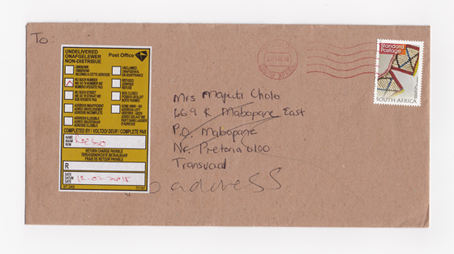Mangolo is a collaborative research project between Title in Transgression (Johannesburg, South Africa) and TransAction Study Group (Stockholm, Sweden), led by Gabi Ngcobo with Petra Bauer
“Your letter is dated 4-12-87 and ours to you was posted on 1-12-87. We have received all your letters and it goes without saying that we can’t cut off our communication with you.” – letter from B.N. dated 8 January 1988.
“…it involves conceiving solidarity as involving a (rather haphazard) relationship of an individual to others at a distance” – Carol C. Gould, Transnational Solidarities, 2007.
During apartheid, money was secretly transferred to South Africa through an operation set up by an organisation called the International Defence and Aid Fund (IDAF) – and the South African Council of Churches (S.A.C.C.) – whose aim was to support the anti-apartheid resistance movement in South Africa. Originally established in the UK, the IDAF developed their operation to include engagements in Sweden, Norway, Australia and Switzerland. From the 1970s to the early 1990s, thousands of letters were sent between private homes in South Africa and Europe as a cover for a money transfer operation. Apart from being a vessel of financial aid for money, the letters testify to the impact of political history on personal experiences through telling the stories of everyday encounters during apartheid.
The letters exchanged relay evidence of anti-apartheid struggles from the perspective of domestic life and include narratives from a group that has been largely neglected by historians, individuals who through the letters left behind significant records of the reach and effect of apartheid. The letters reveal the recipients’ moments of the everyday: the milestones and the ordinary, even if briefly enjoyed in the cloud of apartheid.
This research project, titled Mangolo, takes these letters as a point of departure in order to address issues of political resistance, history writing and transnational aid, and also to look at the possibilities as well as the limitations of using a concept such as solidarity. What do these kinds of relationships look like? How do the dichotomies between financial support and social recognition/agendas demonstrate (if at all) in these letter-writing encounters? How can we address the asymmetry embedded in these correspondences – with a clear division between receiving and “giving”- which, far from incidental, is inscribed into structures of racism and imperialism perpetuated today? Mangolo regards the engagement with individuals involved in the exchange of letters, South African fieldworkers from the S.A.C.C’s Dependents Conference and activists connected to the letter writing project, as walking archives.
As Mangolo is investigating the plurality of histories from two different geographical positions, the project inevitably asks pertinent questions on how different socio-political, cultural and historical contexts impact ways of seeing, interpreting, reflecting, organising and shaping histories and materials.
As part of the 10th Berlin Biennale Public Programme, both collectives will facilitate a live reading of selected letters which have become prominent in Mangolo. This conversation will continue with a screening of our documentation, through text, video and audio recordings of our research with individuals whose lives intersected with the letters sent and received (letter writers, families of detainees, fieldworkers, newspapers). Our presentation acts as a conversation, and a constant-work-in-progress; as such a dense historical narrative can never be locked into space and time.
Mangolo is made as part of a collaboration between and with support from: Tensta konsthall, initiator of the project, and as part of the series The Eros Effect: Art, Solidarity Movements and the Quest for Social Justice; the Royal Institute of Art, Artistic research and development funding, Stockholm (RIA) and Iaspis – the Swedish Arts Grants Committee’s International Programme for Visual and Applied Artists.

